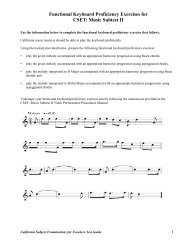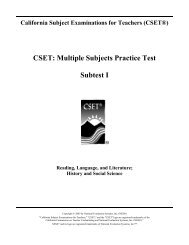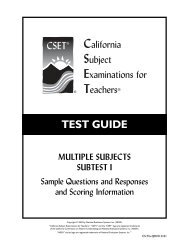TEST GUIDE ENGLISH SUBTEST I - CSETs
TEST GUIDE ENGLISH SUBTEST I - CSETs
TEST GUIDE ENGLISH SUBTEST I - CSETs
You also want an ePaper? Increase the reach of your titles
YUMPU automatically turns print PDFs into web optimized ePapers that Google loves.
English Subtest I<br />
15. Correct Response: B. (SMR Code: 1.1) During the mid-twentieth century, the peoples of many<br />
African nations found themselves living and working within the systems and institutions of European<br />
colonial rule, even though, in many cases, the Europeans had relinquished political control decades earlier.<br />
One of these residual systems was Western education. In this excerpt, Achebe shows the clash between<br />
those Africans who embraced Western education, as well as Western customs and languages, and saw<br />
themselves as "modern" and full of fresh, new, and "wonderful ideas," and others who adhered to the<br />
traditional ways and were regarded as "unprogressive," "narrow," and generally obsolescent.<br />
16. Correct Response: A. (SMR Code: 1.2) Imagist poetry is typically written in free verse, draws on a<br />
wide range of subject matter, is expressed in common speech, and relies on a clear, concentrated image to<br />
convey meaning. In this excerpt, a singular image (a bleak, roadside landscape) is presented in plain<br />
language ("broad, muddy fields / brown with dried weeds") and in no particular metrical or verse form.<br />
17. Correct Response: A. (SMR Code: 1.2) In this passage, the ocean is quite clearly personified as a<br />
pitiless, wrathful being bent on crushing the men in the boat. The ocean has a "slaty," "grim" aspect and a<br />
furious attitude, evinced by the constant "snarling of the crests" and the "final outburst" of one of its<br />
waves.<br />
18. Correct Response: B. (SMR Code: 1.2) The poet uses personification to present this passage from the<br />
point of view of an ox. As the speaker of the poem, the ox comments on humanity's detachment from the<br />
natural world ("there is little of the mountain about them"). The ox judges human beings harshly for their<br />
weakness and isolation ("nothing in the hair or in the terribly fragile limbs but coldness and secrecy").<br />
Unlike animals, who live in harmony with nature, human beings are unable to "settle themselves into<br />
forms that are calm, lasting, and necessary."<br />
19. Correct Response: D. (SMR Code: 1.2) Comic irony results from an amusing reversal of expectations.<br />
In this passage, the reader's expectation of what normally happens at a circus contrasts with the actuality<br />
of the characters' experience. The narrator and her companion are more amused by the despondency of<br />
the performers than by the circus acts themselves, and are more intent on pleasing the clown than on being<br />
entertained by him ("We were so glad we had pleased the poor thing").<br />
20. Correct Response: D. (SMR Code: 1.2) In the opening lines of the poem, the speaker expresses angry<br />
disappointment with "others and their tricks" and withdraws from society. A solitary life in nature offers<br />
freedom from betrayal and conformity ("Bamboo and plum trees do not betray you, / Monkeys and cranes<br />
are tolerant of independent souls"). The imagery presented in the remainder of the poem focuses on the<br />
peaceful beauties of nature, with a single backward glance at the speaker's former life ("As for friends, a<br />
green mountain is enough for me").<br />
21. Correct Response: C. (SMR Code: 1.2) A stream-of-consciousness narrative is characterized by a<br />
writing technique or style that is free and indirect and seeks to record in an all-inclusive way the<br />
continuous flow of the narrator's thoughts, feelings, memories, and expectations. Stream-ofconsciousness<br />
narrative can also be somewhat discursive and repetitive. ("Beaten up, broken up, . . . the<br />
brutality . . . the eager advance . . . of angular men . . . of flaunting women . . . the domes and spires . . .<br />
the last relics. . . .")<br />
22. Correct Response: A. (SMR Code: 1.2) Deus ex machina, literally "god from the machine," is a Latin<br />
phrase derived from ancient Greek. In ancient Greek drama, gods were lowered onto the stage by a<br />
mechanism to extricate characters from a seemingly hopeless situation. The phrase has come to mean any<br />
turn of events that solves the characters' problems through an unexpected and unlikely intervention.<br />
40 California Subject Examinations for Teachers Test Guide








